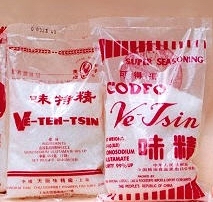 Research has recently discovered that MSG is a neurotoxin, that is, it can kill or injure neurons. A study most recently published in Human and Experimental Toxicology suggests that SMG can induce oxidative damage and genotoxicity in the liver, kidney and brain of at least rats for now.
Research has recently discovered that MSG is a neurotoxin, that is, it can kill or injure neurons. A study most recently published in Human and Experimental Toxicology suggests that SMG can induce oxidative damage and genotoxicity in the liver, kidney and brain of at least rats for now.Olatunde Farombi and O. O. Onyema from College of Medicine University of Ibadan in Nigeria found rats exposed to MSG increased the production of a toxic chemical known as malondialdehyde in the liver, kidney and brain.
On the other hands, vitamin C, vitamin E and quercetin - three antioxidants when simultaneously administered to MSG treated rats reduced the production of the toxic malondialdehyde in the animals.
Relatively, vitamin E benefits the liver more than vitamin C and quercetin while vitamin C and quercetin protects the brain more effectively than vitamin E, according to the study report.
It was also found that MSG decreased the glutathione level in the three organs which responded with an increase in the activity of glutathione-S-transferase. Glutathione is a reducing agent (a good compound) and its decrease indicates an increase in oxidative stress. Do we need to worry about the toxicity of MSG?
The rats in the study was exposed to a dose of 4 mg /gram of body weight, which for a man with a 80,000-gram (176 pounds) body weight means he needs to use 320 grams of MSG? T he normal usage level of MSG in a meal served at a restaurant is probably 0.1 to 0.5 grams. However, those with liver diseases may be more sensitive to the toxicity of MSG.
The researchers concluded "T he results (of the study) indicate that dietary antioxidants have protective potential against oxidative stress induced by MSG and, in addition, suggest that active oxygen species may play an important role in its genotoxicity."





